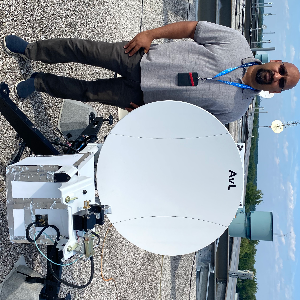525.774.3VL - RF & Microwave Circuits I
Description
In this course, students examine RF and microwave circuits appropriate for wireless communications and radar sensing. The course emphasizes the theoretical and experimental aspects of micro-strip design of highly integrated systems. Computer-aided design techniques are introduced and used for the analysis and design of circuits. Circuits are designed, fabricated, and tested, providing a technically stimulating environment in which to understand the foundational principles of circuit development. Couplers, modulators, mixers, and calibrated measurements techniques are also covered.
Instructor

Avinash Sharma
Course Structure
Under Modules you can find the weekly lectures. Due dates for assignments are listed on each assignment and should be on the calendar as well.
Course Topics
- Tlines and S-Parameters
- Matrix Analyis, SFGs, and CAD
- Linear CAD and Physical Tlines
- Power Dividers, Couplers, etc.
- NWA Meas., Calibration, De-embed
- Matching Networks--LE, DE, Bode
- Lab1--Calibration, Meas., Couplers
- Filters
- Diodes--Mixers, Modulators, and Switches
- Project Discussion
- Mixers II ; ADS and MWO
- Other Circuits
- Lab2--Mixer, Filter, Switch
- Final Project Due
Course Goals
Learn the fundamentals of microwave design and the use of microstrip circuits to build and test actual designs fabricated for the laboratory portion of this course.
Textbooks
Highly Recommended but not required:
Microwave Engineering by David Pozar (Wiley)
Required Software
Students will use ADS or MWO to design microwave circuits.
Student Coursework Requirements
30% HW and Labs
70% Final Project
10% penalty per week for late homework
Grading Policy
A=90-100, B=80-89
Academic Policies
Deadlines for Adding, Dropping and Withdrawing from Courses
Students may add a course up to one week after the start of the term for that particular course. Students may drop courses according to the drop deadlines outlined in the EP academic calendar (https://ep.jhu.edu/student-services/academic-calendar/). Between the 6th week of the class and prior to the final withdrawal deadline, a student may withdraw from a course with a W on their academic record. A record of the course will remain on the academic record with a W appearing in the grade column to indicate that the student registered and withdrew from the course.
Academic Misconduct Policy
All students are required to read, know, and comply with the Johns Hopkins University Krieger School of Arts and Sciences (KSAS) / Whiting School of Engineering (WSE) Procedures for Handling Allegations of Misconduct by Full-Time and Part-Time Graduate Students.
This policy prohibits academic misconduct, including but not limited to the following: cheating or facilitating cheating; plagiarism; reuse of assignments; unauthorized collaboration; alteration of graded assignments; and unfair competition. Course materials (old assignments, texts, or examinations, etc.) should not be shared unless authorized by the course instructor. Any questions related to this policy should be directed to EP’s academic integrity officer at ep-academic-integrity@jhu.edu.
Students with Disabilities - Accommodations and Accessibility
Johns Hopkins University values diversity and inclusion. We are committed to providing welcoming, equitable, and accessible educational experiences for all students. Students with disabilities (including those with psychological conditions, medical conditions and temporary disabilities) can request accommodations for this course by providing an Accommodation Letter issued by Student Disability Services (SDS). Please request accommodations for this course as early as possible to provide time for effective communication and arrangements.
For further information or to start the process of requesting accommodations, please contact Student Disability Services at Engineering for Professionals, ep-disability-svcs@jhu.edu.
Student Conduct Code
The fundamental purpose of the JHU regulation of student conduct is to promote and to protect the health, safety, welfare, property, and rights of all members of the University community as well as to promote the orderly operation of the University and to safeguard its property and facilities. As members of the University community, students accept certain responsibilities which support the educational mission and create an environment in which all students are afforded the same opportunity to succeed academically.
For a full description of the code please visit the following website: https://studentaffairs.jhu.edu/policies-guidelines/student-code/
Classroom Climate
JHU is committed to creating a classroom environment that values the diversity of experiences and perspectives that all students bring. Everyone has the right to be treated with dignity and respect. Fostering an inclusive climate is important. Research and experience show that students who interact with peers who are different from themselves learn new things and experience tangible educational outcomes. At no time in this learning process should someone be singled out or treated unequally on the basis of any seen or unseen part of their identity.
If you have concerns in this course about harassment, discrimination, or any unequal treatment, or if you seek accommodations or resources, please reach out to the course instructor directly. Reporting will never impact your course grade. You may also share concerns with your program chair, the Assistant Dean for Diversity and Inclusion, or the Office of Institutional Equity. In handling reports, people will protect your privacy as much as possible, but faculty and staff are required to officially report information for some cases (e.g. sexual harassment).
Course Auditing
When a student enrolls in an EP course with “audit” status, the student must reach an understanding with the instructor as to what is required to earn the “audit.” If the student does not meet those expectations, the instructor must notify the EP Registration Team [EP-Registration@exchange.johnshopkins.edu] in order for the student to be retroactively dropped or withdrawn from the course (depending on when the "audit" was requested and in accordance with EP registration deadlines). All lecture content will remain accessible to auditing students, but access to all other course material is left to the discretion of the instructor.